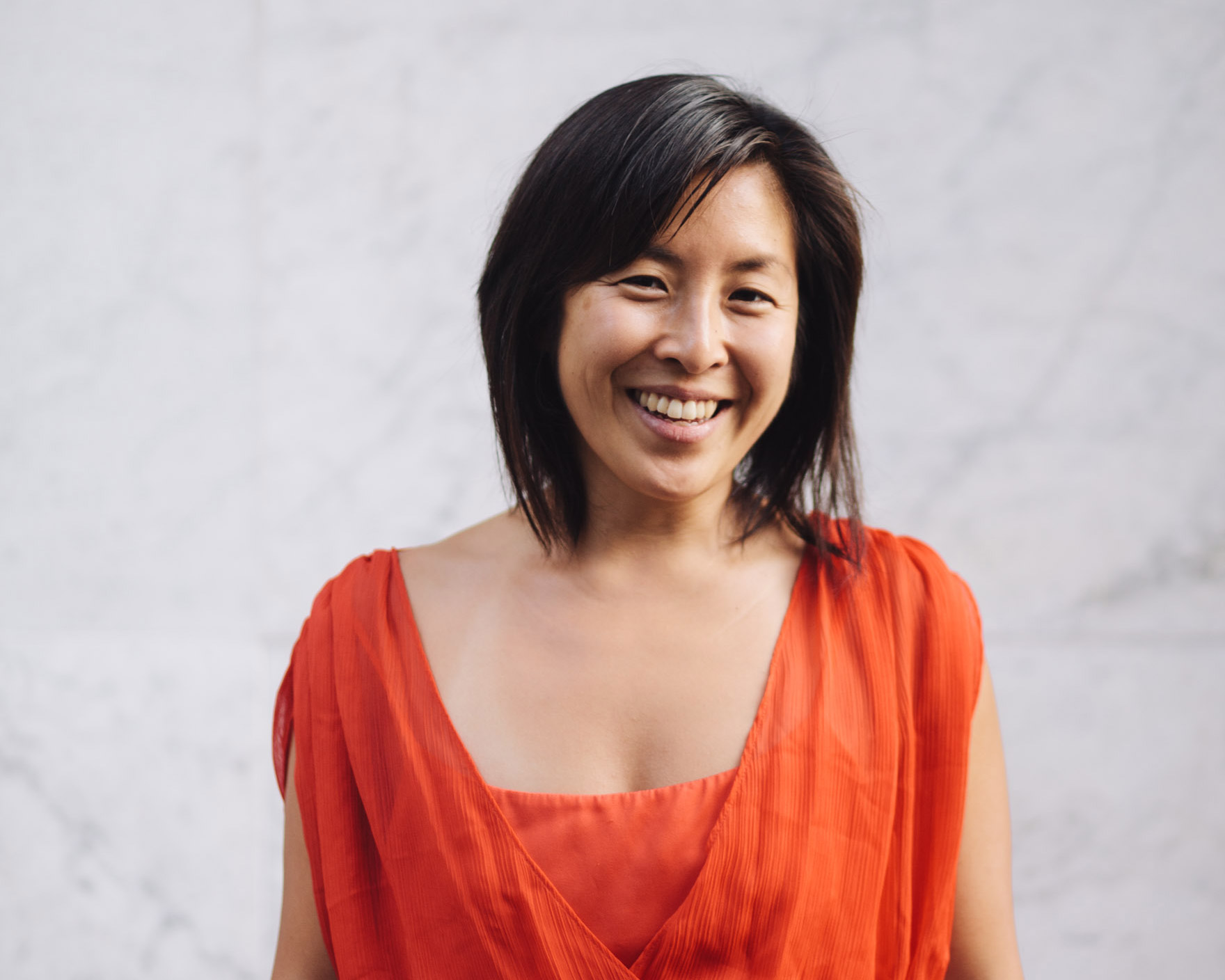
- Interview by Tina Essmaker October 7, 2014
Jerri Chou
- entrepreneur
Jerri Chou is a New York City-based entrepreneur, social innovator, and founder of The Feast. She was previously a cofounder of All Day Buffet, TBD, and Lovely Day. Her work has been featured in Forbes, Fast Company, Entrepreneur Magazine, and more, and she believes that we created this world and we can create a better one.
Tina: Describe your path to what you’re doing now.
I’ve always been interested in changing the world, even when I was young. I really loved Captain Planet and wanted to make a difference. (laughing) That evolved when I was in school and began thinking about what I wanted to do with my life. During college, I was actually on a business track for a while. At that time, there wasn’t really such a thing as social business, but I’d say things like, “Globalization isn’t always inherently good,” and people would look at me like I had five heads. I thought, “Well, maybe this isn’t for me,” so I switched to studying communications.
I had the realization that there are people in marketing and communications who are convincing us that buying things will make us happy. I thought it would be interesting to learn how that worked and apply it to doing good, making it more aspirational. After school, I worked in communications for a while, and then I met a group of people who were also interested in changing the world, leveraging their skill sets and the diverse disciplines they worked in. That’s the genesis of The Feast: this community coming together saying, “We’re really good at what we do, and if we can apply that to look at problems and solutions in a different way, then that could create something really interesting.”
You mentioned college. I know you’re in New York now. Did you go to school here, too?
I went to school in Boston. After school, I briefly lived in Paris and LA before coming to New York. I’m actually from Long Island, so, growing up, New York was this big place—a little too big for me. But after school, I was ready to live here. I moved to Brooklyn first, and I still remember this funny vision of looking across the East River onto the city and thinking, “I’m going to take over Manhattan.” (laughing)
That’s awesome! So, you run The Feast Conference, which happens once a year in New York, but you spend the year planning. Is your work geared toward the culmination of that event? I first heard of The Feast because of the event. It’s more than that, right?
Yes. We’re building a community of people who are bringing their best to the table. We’re asking how people can apply how they see the world to making the world a better place. And the way we do that is through events, which are held throughout the year, but the conference is the big one. Dinners are hosted throughout the year via The Feast Worldwide, which is in multiple cities and features amazing innovators and entrepreneurs who rally the community around them. We do spend a lot of time building up to the conference, which is the big hurrah, but we’re thinking more and more about how we can foster a sense of community over time, and that’s where we’ve shifted our focus over this past year.
There are so many conferences and events out there, and I like that you’re focusing on helping people become involved in their own communities. What has the evolution of The Feast been? It’s big now, but did it start out that way?
The Feast started out really small, with 120 people for the first one in 2008; my partner at the time, Michael Karnjanaprakorn, and I actually paid for it with our credit cards and hoped for the best. At first we were doing small events that started taking off around the country, and we knew there was something there. I didn’t yet know what it was, but people were excited about it.
I was working a day job, and I had a choice: continue working my day job while pursuing this thing on the side and doing something with it later down the road or quitting my day job and figuring it out along the way. I chose the latter.
Wow! Out of curiosity, what was your day job?
I was working at startups, mostly digital media companies.
“I had the realization that there are people in marketing and communications who are convincing us that buying things will make us happy. I thought it would be interesting to learn how that worked and apply it to doing good, making it more aspirational.”
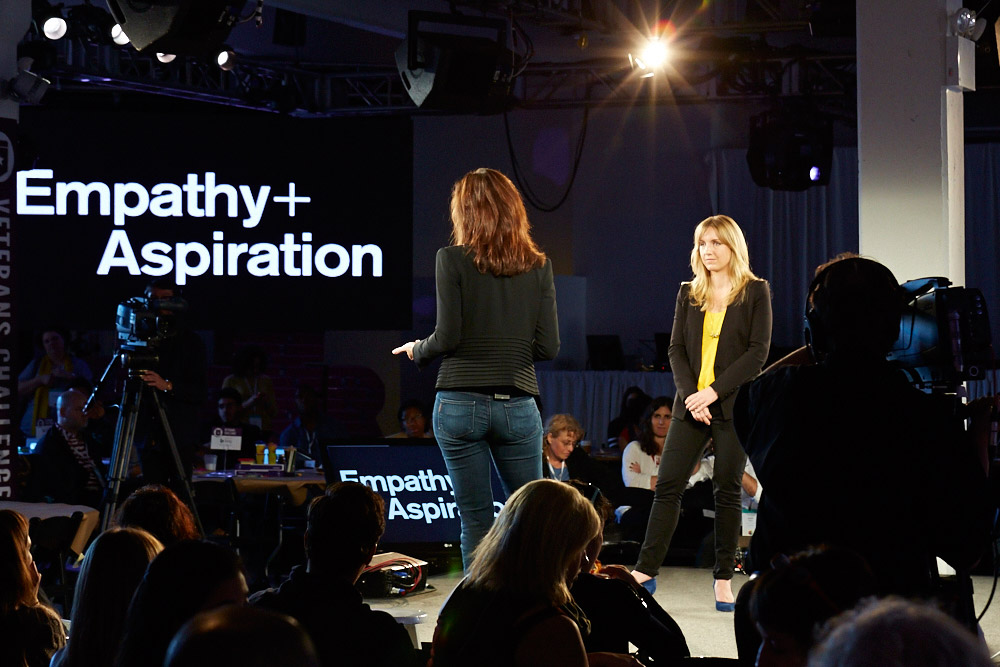
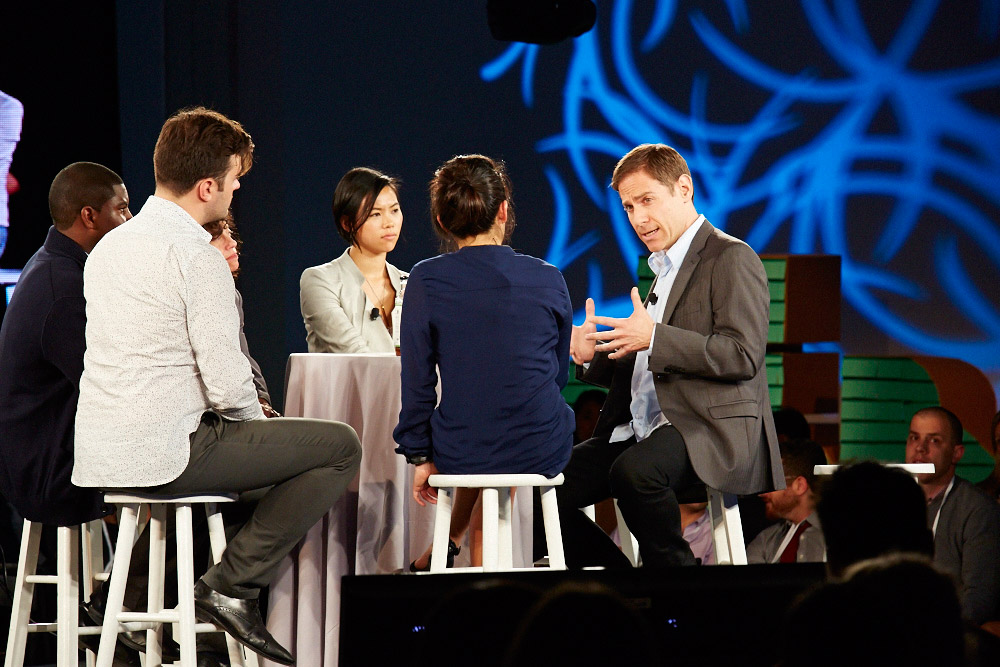
The first Feast, which you charged to your credit card, must have done well because you’ve continued to do it.
The community grew relatively quickly for the first few years; it struck a chord and there was a lot of excitement around it. In 2010, we paused and started rethinking what The Feast could be. When we started, there wasn’t a place for people like us, and I think we helped to galvanize what’s become a pretty robust community of social innovators. Now, there are pockets of these communities. In 2010, we realized that we’d kind of achieved what we had initially set out to do, and we asked ourselves, “Now what?” Since 2010 it’s been a process of figuring out what this event can actually do. I’m excited to see how it continues to grow and change.
Are you focusing on The Feast full-time?
I’m pretty focused on it. There are so many different products that already exist within The Feast, so I’m trying to figure out which ones I want to be my priority.
And how do you refer to what you do? Do you consider yourself a social innovator or entrepreneur?
I feel like what I’ve been doing is a little bit meta because it’s about bringing people together. It’s more like being a community architect because I’m helping to create a space where innovation can happen.
Was creativity part of your childhood?
Even though I wanted to be a marine biologist when I was young, I think I’ve always been creative and imaginative. But I never had any idea it would unfold the way it did. I do think I can imagine things that don’t exist yet, and I hang out with so many creative people that it’s sometimes easy to forget that not everyone’s brain works like that. It’s been cool to be increasingly surrounded by people who can see opportunities because I don’t think I was surrounded by that very much as a kid. Both of my parents are analytical and math-oriented, so I was definitely the odd one out.
Did you have an “Aha!” moment when you knew that this was what you wanted to do?
That moment I quit my day job was the moment—it was the beginning of a journey of creation. Also, it’s been incredible year after year, but this is the first year I’ve thought, “I could do this for the rest of my life,” which is a big moment to have.
That’s a pretty big risk to quit your day job and say, “I feel like there’s something here, and I need to explore it.” Has that been the biggest risk you’ve taken, and how did you get to that place? I think people entertain that kind of thing, but most of us don’t actually do it. It’s scary.
Yeah. There were a couple of moments of risk, and quitting my job was a big one. When you have to, you do; when you put everything that you have access to on the line to make something work, chances are you can get it to work, unless the thing you’re trying to do doesn’t make sense at all. I didn’t know that at the time. There was so much excitement around it that I thought, “How can it not work?!” To me, it was just a matter of time.
I had the realization that, as creative people, the way we think and the skills we have are in demand. The worst that can happen is you get another job somewhere else, even if you have to move. Chances are you have skills that make you hirable. Maybe you build some debt. But it’s not that bad.
I think the other risk was when I fully took over The Feast in 2011 and started re-envisioning what it could be. It was the most capital-intensive conference we’d done; that was kind of scary. I had to raise a whole bunch of money to do this thing, and I wasn’t sure how I was going to do it. Even then, the worst thing that could have happened would’ve been canceling or postponing the event.
I have a coach and she was talking to me the other day about how we tend to see things in black and white, like something is either going to work or not work. There are actually a million realities that could play out. When you see the outcome as more than black-and-white, it makes things more possible. It’s liberating.
You mentioned having a coach. Have you had any mentors?
I feel like I’m just now building relationships with mentors who’ve been insightful about the bigger picture. It’s easy to get bogged down in the day-to-day details, but having people who believe in the overarching vision and can help me think bigger has been inspiring.
The people on my team have also been great mentors. Part of The Feast is this idea that everybody is talented and capable, and when we’re given the opportunity to realize what we can do, it will change the way we work. We try to present those opportunities to each other. It’s nontraditional. As a result, there’s a lot of co-leadership that happens, which can be great and challenging. I learn a lot from my team.
How big is your team?
There are four core people and it scales up and down with people who help on production.
Are your family and friends supportive, and what did they say when you told them you were quitting your day job?
I don’t think I told them, or at least I didn’t frame it that way. They didn’t really understand what I was doing before anyway, so that helped. My mom is an immigrant and grew up very poor, so money was always a concern. When she started seeing press around what I was doing, like when The Feast was in Forbes a few years ago, she felt better about it.
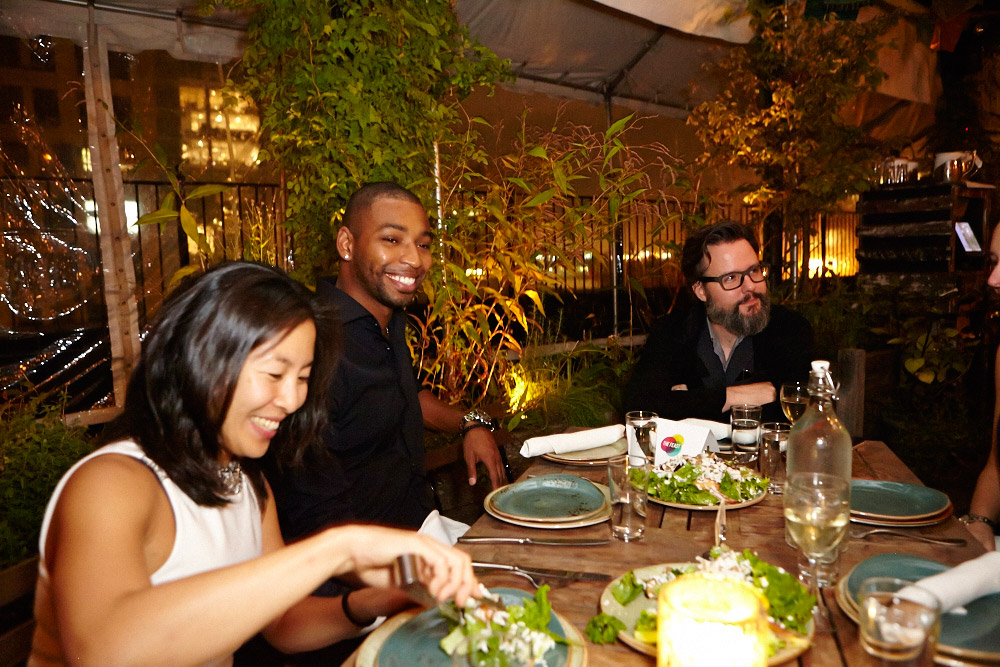
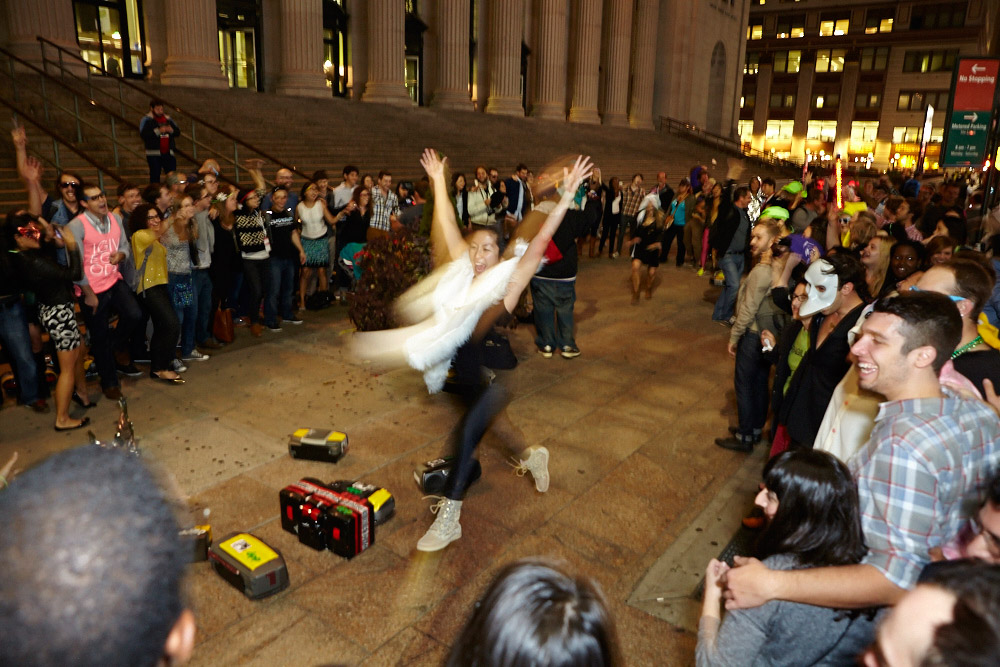
“Part of The Feast is this idea that everybody is talented and capable, and when we’re given the opportunity to realize what we can do, it will change the way we work.”
I’m pretty sure you’re going to say yes to this next question, but would you expound on your answer? Do you feel a responsibility to contribute to something bigger than yourself?
That’s everything I do. If anything, I feel like I’ve returned to doing more for myself in recent years because so much has been about others. I practice a lot of meditation, which helps with perspective. If you’re doing what you should in the world, then what you do for yourself and what you do for others are one and the same. My thing happens to be socially oriented, but, in the end, doing what I feel like I’m meant to do in this life is inherently part of something greater.
Are you creatively satisfied?
Yes! If anything, there’s too much creativity. I really need a chief operating officer or something to help with the nitty-gritty organizational tasks. We get to play and think a lot, and I feel fortunate all the time. Some of the work is really challenging because we’re thinking about interaction models—it’s not always pie-in-the-sky stuff—but it’s still fun to tackle.
Is there anything you’re interested in doing or exploring in the coming years?
Yes. I have so many projects that I wish I had time to do. I’ve been really interested in thinking about networks of communities, and how a community is created. What are the generative principles at the core of a community?
What advice would you give to someone starting out?
Be prepared for the unexpected, and be open to possibilities. You never know how people or connections or the spark of an idea will spin something in a different direction. You never know who you’ll be introduced to or who will become important to you. Trust your gut about the kind of people you want to surround yourself with and the intention behind why you’re doing what you’re doing, and see what results. One of the people I’m working with now said something really great to me: “Plan for Plan A, but life happens in the Plan B. Life is a continuous living and unfolding of Plan B as you go.” Try your best to map things out, but also be prepared to respond to things as they happen.
That’s good. How does where you live influence your work?
I live in the West Village right now, and I think it impacts me so much. I’m influenced by the space I’m in—how spacious it is and who is there—and the location. I can tell the difference between New York and California; the sense of time and distance affects how I process things and what I focus on. Living in West Village is exciting; I love the neighborhood. It reminds me of change because there are age-old Italian pastry shops and the streets are from pre-grid days. But there is an evolution happening and it creates a sense of impermanence, which is nice. The city and everything we’re doing is evolving. It’s hard to say, “This is the thing that’s going to be the thing forever,” because it won’t be. It helps me not get stuck in one way of thinking.
Is it important to be part of a creative community of people?
Totally. In part because when you’re creating something, having people who can make those things happen is, not only necessary, but also inspiring. You get to be behind the scenes of the magic, if you will. You get to dream up new things. That doesn’t happen in every community. Having camaraderie with people who know what it takes to make something is important to the evolution of your ideas; feedback about next steps or who to talk to or having someone be there for you when it’s hard—that’s important.
What does a typical day look like for you?
Days aren’t typical, but I do a lot of talking to people about opportunities. I think this is why I’m so optimistic all the time. I do outreach to interesting people, whether they’re potential speakers or companies who are doing interesting work. I tend to connect people at least once a day. As The Feast Conference comes up, I’m dealing with a lot of logistics and budget stuff. Then there’s a lot of thinking through things on a meta level, like how we’re going to continue building on what we do.
Alright, I have a few favorites questions. Is there any music you’re into right now?
I’m not into particular albums; as a genre, I’ve been enjoying electronic music.
Do you have any favorite movies or TV shows?
Oh, man. House of Cards was super fascinating.
What’s your favorite book?
A Pattern Language by Sara Ishikawa, Christopher Alexander, and Murray Silverstein.
Your favorite food?
People who work with me will say “green juice.” (laughing) I’m a huge juicer. Juice Press owns me!
What kind of legacy do you hope to leave?
A pretty big one. Again, at the core of The Feast there’s this idea that everybody is way more talented and capable than they think they are. I think that, for the most part, our society has said that you should be humble and not think outside of the box and just find “the job.” Now, especially with the amount of connectivity and access to knowledge and people, we’re getting to the place where we can do almost anything. There are parts of the system that need to change to make that possible, especially in the creative world where the system of money doesn’t always correlate in value to what’s being provided. But I want people to understand that they can rewrite the rules and do whatever they want, which is going to mean creating different types of systems. The legacy I want to leave is more about people helping each other do what they were meant to do in the world. It’s a big legacy, but it’s why I do what I do.
“If you’re doing what you should in the world, then what you do for yourself and what you do for others are one and the same…in the end, doing what I feel like I’m meant to do in this life is inherently part of something greater.”